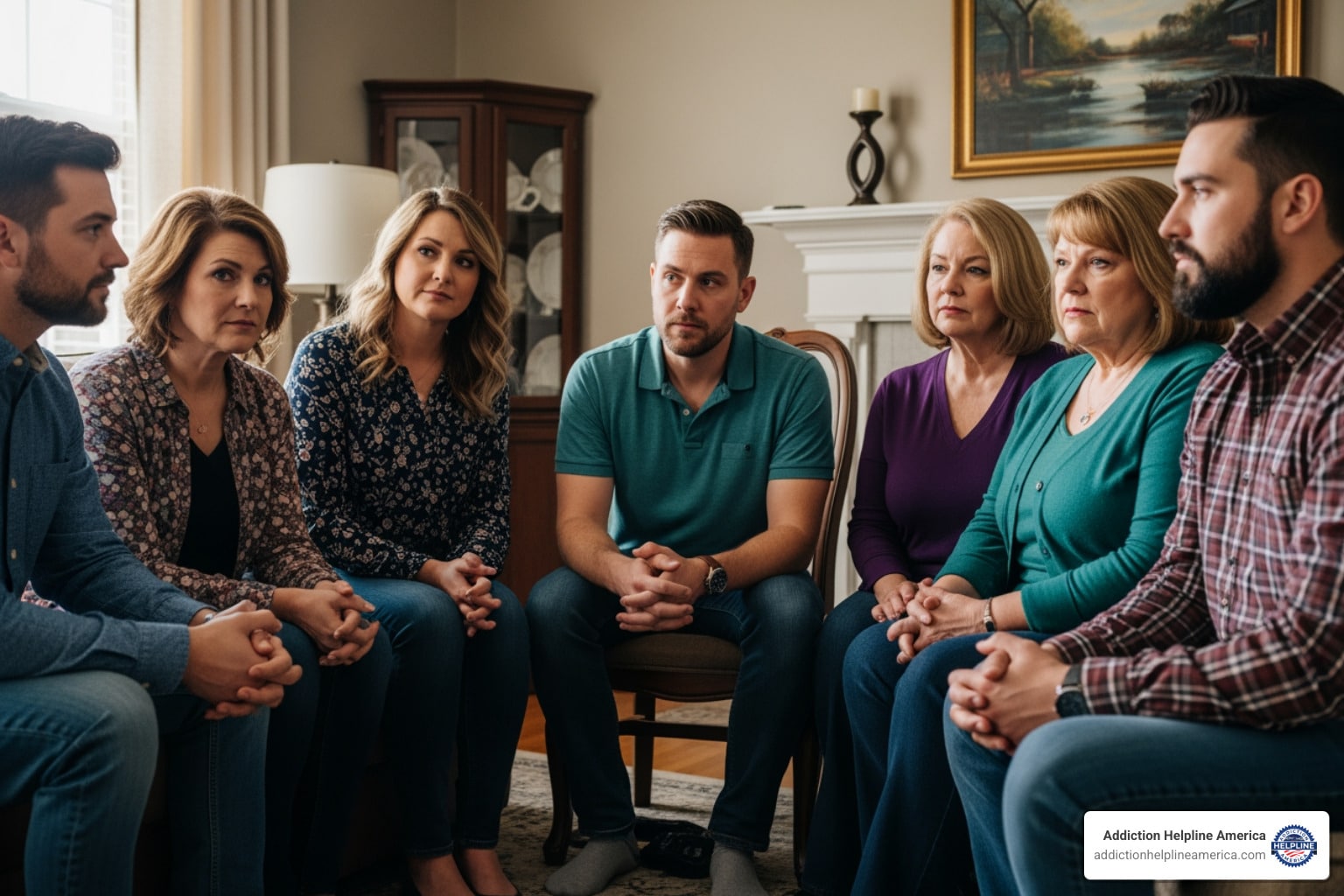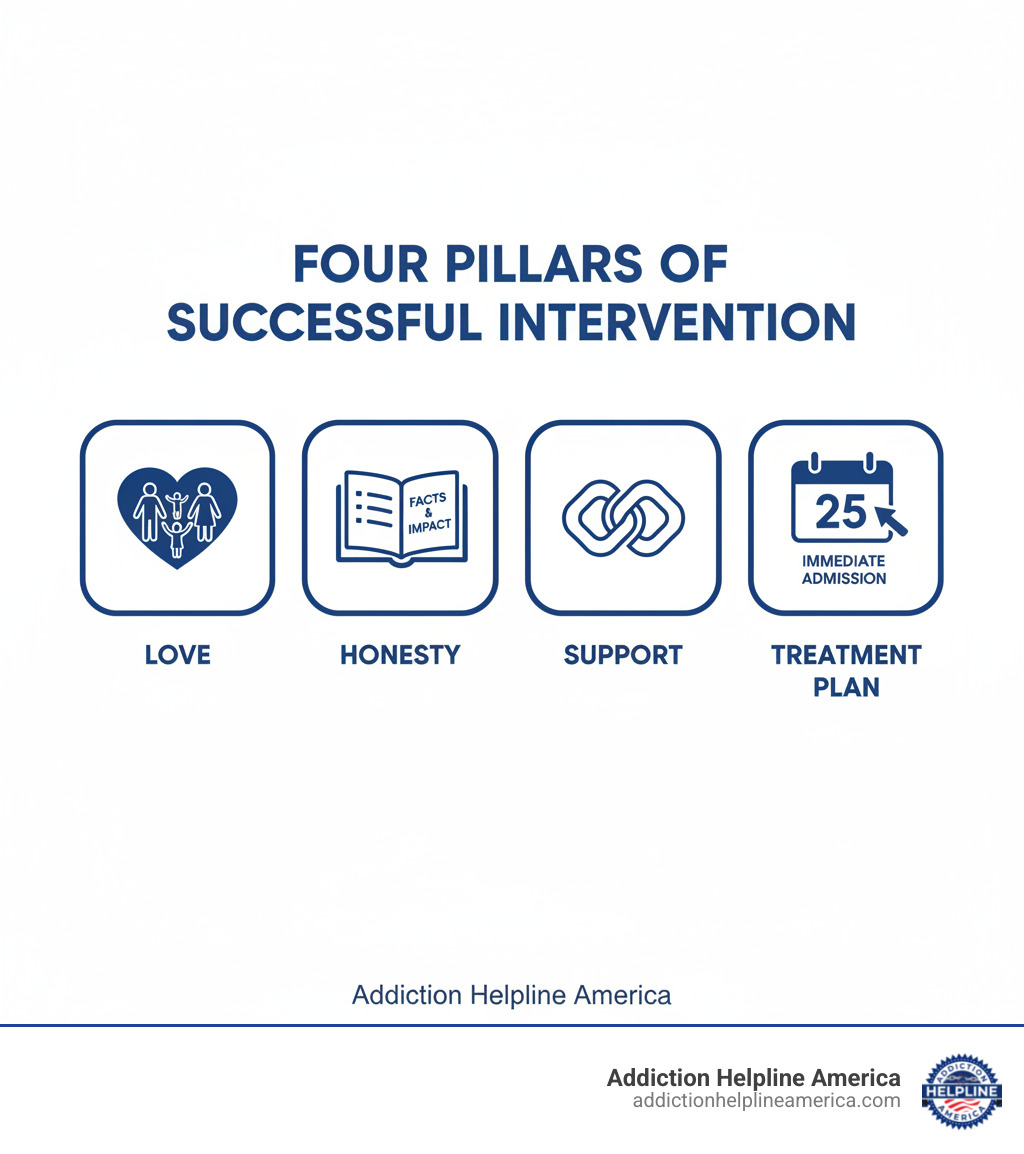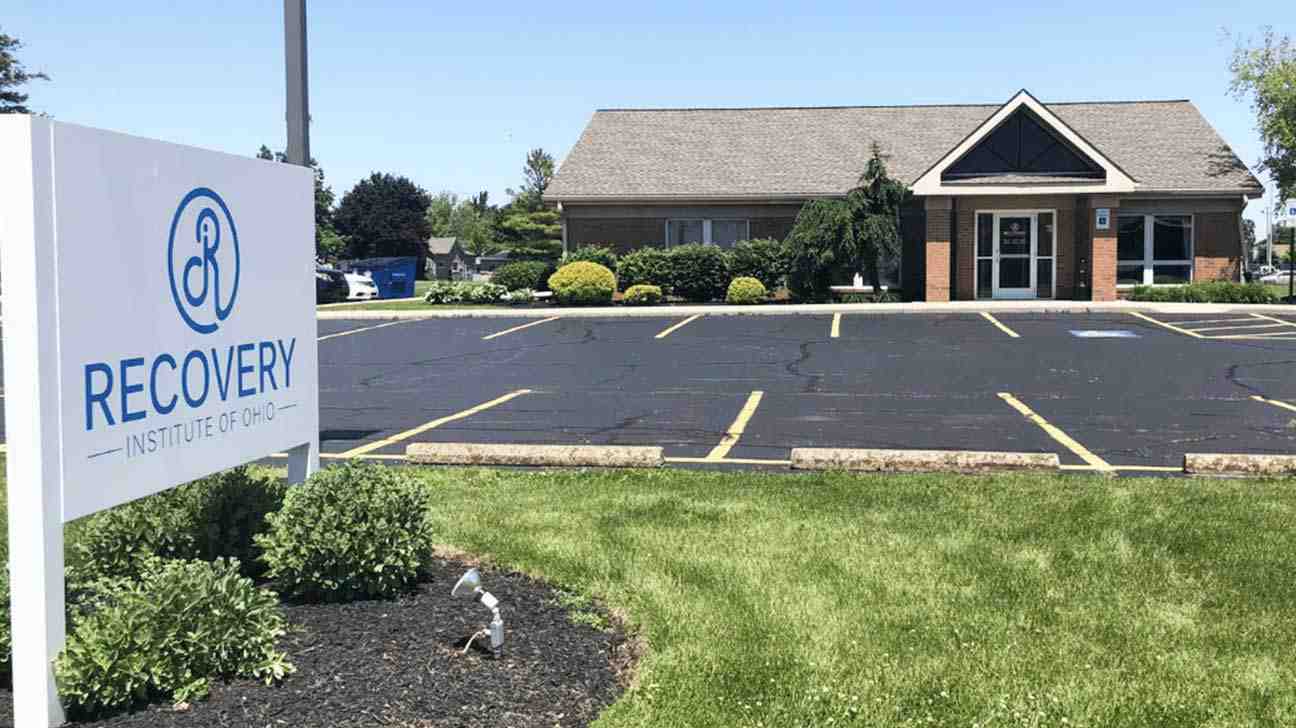
When Love Demands Action: Understanding Drug Intervention
A drug intervention is a structured meeting where loved ones confront someone about their addiction, express concerns, and present a pre-arranged treatment plan. Here’s what you need to know:
Key Elements of a Successful Drug Intervention:
- Who attends: 4-6 close family members, friends, or colleagues
- The approach: Love-based, non-confrontational, and fact-focused
- The goal: Help the person recognize their addiction’s impact and accept immediate treatment
- Success rate: Up to 90% when well-planned with professional guidance
- What’s offered: A pre-arranged treatment program with immediate admission available
If substance abuse has led to broken promises, damaged relationships, or health crises—and your loved one remains in denial—an intervention can be a life-saving turning point. It’s not an ambush; it’s a carefully created opportunity for denial to break down, surrounded by people who refuse to watch addiction win.
At Addiction Helpline America, we’ve guided thousands of families through the drug intervention process. Our 24/7 helpline provides the immediate support you need to take this critical first step toward recovery.

Simple guide to drug intervention terms:
Understanding the Need for an Intervention
What is a drug intervention and why is it necessary?
When someone you love is trapped in addiction, logic and pleading often fail. Addiction creates powerful denial, preventing them from seeing the reality of their situation. A drug intervention is a structured, compassionate conversation designed to break through that denial. It’s not an attack, but a unified effort by loved ones to present the reality of the addiction’s impact and offer an immediate, pre-arranged path to treatment. The goal is to create a moment of clarity where the person can finally accept the help they desperately need.
For background on why addiction affects judgment and behavior, see the National Institute on Drug Abuse’s overview: Understanding Drug Use and Addiction.
Signs Your Loved One Needs Help
Addiction leaves clear fingerprints on a person’s life. If you recognize several of the following signs, it may be time to consider an intervention.

- Neglecting Responsibilities: Missing work or school, failing to pay bills, or neglecting family duties.
- Secrecy and Lying: Constantly being dishonest about their whereabouts, finances, or activities.
- Health and Appearance Changes: Significant weight loss or gain, poor hygiene, bloodshot eyes, tremors, or unexplained injuries.
- Extreme Mood Swings: Unpredictable shifts between irritability, anxiety, aggression, and depression.
- Financial Problems: Constantly borrowing or stealing money, unpaid bills despite having an income.
- Relationship Issues: Pulling away from family and old friends, frequent arguments, and defensiveness.
- Legal Troubles: DUIs, possession charges, or other issues with the law.
Trust your instincts. If you see these patterns, acting early can prevent a tragedy.
Intervention vs. Everyday Conversation: What’s the Difference?
An intervention is fundamentally different from the spontaneous, emotional arguments you’ve likely already had. Here’s how:
- Planned, Not Spontaneous: An intervention is carefully planned over days or weeks, not a reaction in the heat of the moment.
- A United Front: A group of 4-6 respected loved ones presents a unified message, making denial much harder to maintain.
- Structured and Guided: It follows a format, often led by a professional, to keep the conversation focused on love and facts, not blame and anger.
- An Immediate Solution: It concludes with the offer of a pre-arranged spot in a specific treatment program, ready to go immediately.
- Clear Consequences: The team agrees on specific, firm consequences that will be enforced if the person refuses help, ending the cycle of enabling.
An intervention is a strategic act of love designed to be the conversation that finally changes everything.
Preparing for a Compassionate and Effective Intervention
A successful drug intervention hinges on careful preparation. Every detail, from who attends to what is said, must be thoughtfully planned to create a powerful moment of clarity and motivation.
Assembling Your Intervention Team
Bigger is not better. The ideal team is a small, focused group of 4 to 6 people whom your loved one likes, respects, and depends on. This could include a spouse, parent, adult child, best friend, or respected mentor. Unity is key; every member must be committed to delivering the same message of love, concern, and the need for immediate help.
Who to exclude:
- Anyone with their own unmanaged addiction or mental health issues.
- People who are prone to anger, blame, or high emotionality.
- Known enablers who are likely to back down on consequences.
- Anyone your loved one actively dislikes or resents.

The Role of a Professional Interventionist
Families often need objective, experienced guidance. A professional interventionist provides structure, safety, and expertise that dramatically increases the chances of success.
You should absolutely hire a professional if your loved one:
- Has a history of violence or aggression.
- Has a co-occurring serious mental illness (e.g., bipolar disorder, schizophrenia).
- Has made suicidal threats or attempts.
- Is abusing multiple substances.
A professional educates the family, helps the team prepare, keeps the meeting on track, and facilitates immediate admission to treatment. At Addiction Helpline America, we can connect you with experienced, compassionate interventionists who are qualified to guide your family through this process.
Emotional and Practical Preparation
This is where the real work happens. Your team must be aligned and ready.
- Write Impact Statements: Each person should write a short letter focusing on love and concern. Use “I feel” statements tied to specific examples (e.g., “I felt scared when you didn’t come home last Tuesday”). Avoid blame and accusations. Practice reading it calmly.
- Arrange Treatment: Before the intervention, research and select a treatment program. Confirm they have a spot available for immediate admission. Have all the details ready.
- Handle Logistics: Choose a neutral, private location. Schedule the meeting for a time when your loved one is likely to be sober. Plan for it to last 60-90 minutes. Have a bag packed and transportation ready.
- Rehearse: Do a full run-through with your team and the interventionist. This builds confidence and ensures everyone stays on message.
- Manage Expectations: Success isn’t only defined by an immediate “yes.” Planting the seed of change and establishing healthy boundaries are powerful victories in themselves.
Call Now – Your Journey to Recovery Begins Today!

Take the first step towards a healthier life! Call now to connect with our compassionate team and start your recovery journey today. Your path to healing awaits!
Our recovery specialists are available 24/7 to provide support, and all calls are confidential and free. Reach out anytime – we’re here to help!
A Step-by-Step Guide to Staging a Drug Intervention
With your team assembled and preparations made, it’s time to stage the drug intervention. The approach you choose and the way you conduct the meeting are critical to its success.
Choosing the Right Intervention Approach
Different families require different methods. A professional can help you choose, but here are some common models:
- The Johnson Model: The classic, surprise-style intervention where a team confronts the individual with love, facts, and a pre-arranged treatment plan. It is effective for those deep in denial.
- The ARISE Method: A more collaborative, invitation-based approach that involves the individual from the beginning and works through stages, reducing confrontation.
- The Family Systemic Model: This approach involves the entire family in counseling to address the unhealthy dynamics (like codependency and enabling) that have formed around the addiction.
- The Love First Approach: Similar to the Johnson Model, but with a heavy emphasis on heartfelt letters expressing love and support before outlining consequences.
- CRAFT (Community Reinforcement and Family Training): This method teaches family members to use positive reinforcement and natural consequences to motivate a resistant loved one toward treatment over time.
The Day of the Intervention: What to Expect
On the day of the intervention, trust your preparation and lead with compassion.
- Set the Scene: Meet in a neutral, private location at a time when your loved one is most likely to be sober.
- The Opening: The professional interventionist will begin, explaining that everyone is there out of love and concern.
- Read the Letters: Each team member calmly reads their prepared impact statement, focusing on specific examples and personal feelings.
- Present the Plan: The interventionist or a family member will present the pre-arranged treatment option(s), explaining the logistics and why it was chosen.
- Ask for a Decision: Clearly and lovingly ask for an immediate commitment to go to treatment right now. The goal is to act on the motivation created in the room.
Your loved one may react with anger, denial, or tears. The interventionist will help manage these reactions, and your team’s job is to remain calm, united, and on-script.
Common mistakes to avoid during a drug intervention

- Being Impulsive: Never stage an intervention without careful planning and preparation.
- Blaming and Shaming: Guilt trips and accusations will only build walls. Focus on love and concern.
- Being Vague: Use specific examples of behaviors and their impact, not general complaints.
- Arguing or Yelling: If the meeting devolves into a fight, the opportunity is lost. Stay calm.
- Intervening While They’re Intoxicated: They cannot process information or make rational decisions. Wait for a window of sobriety.
- Not Having a Plan: You must have a pre-arranged treatment spot ready for immediate admission.
- Not Following Through: If you state consequences for refusing treatment, you must enforce them. Otherwise, your boundaries are meaningless.
Navigating the Outcomes and the Path Forward
The drug intervention is a pivotal moment, but it’s the beginning of the journey, not the end. How you steer the outcome—whether it’s a “yes” or a “no”—is crucial for everyone’s healing.
What to Do When They Say “Yes”
An agreement to get help is a victory that requires immediate action to solidify.
- Act Immediately: Motivation is highest in the moments after an intervention. Transport your loved one directly to the pre-arranged treatment facility. Do not delay.
- Express Love and Pride: Reassure them that they are making a brave and powerful decision. Let them know you believe in them and will be there to support them.
- Begin Your Own Healing: While your loved one is in treatment, the family must begin its own recovery. This is the time to address enabling behaviors and learn healthier dynamics.
What Happens if They Refuse Help?
Hearing “no” is heartbreaking, but it is not a failure. The intervention has still broken through denial and planted a powerful seed. Your next steps are critical.
- Enforce Consequences Immediately: You must follow through on the boundaries you set. If you said you would no longer provide money or housing, you must stick to it. This is not punishment; it is ending the enabling that allows the addiction to thrive.
- Set Healthy Boundaries: Protect your own well-being by refusing to participate in the chaos of addiction. This means not making excuses for them, not bailing them out of trouble, and not shielding them from the natural consequences of their choices.
- Keep the Door to Help Open: Make it clear that while you will no longer support the addiction, you will be there the moment they are ready for treatment. The offer of help should always remain on the table.
Supporting Recovery and Family Healing
Addiction is a family disease, and recovery must be a family process. Whether your loved one is in treatment or not, the family needs to heal.
- Seek Family Therapy: A therapist can help your family unpack the trauma of addiction, improve communication, and establish healthier roles and boundaries.
- Find Support Groups: Groups like Al-Anon and Nar-Anon provide invaluable peer support from others who understand exactly what you’re going through. They offer education, coping strategies, and a sense of community.
- Educate Yourself: Understanding the science of addiction helps you support recovery without enabling. Recovery is not a straight line; knowledge prepares you for the journey’s ups and downs.
- Rebuild Trust Slowly: Trust is rebuilt through consistent, demonstrated actions over time, not just words. Be patient with this process for both your loved one and yourself.
Your role will evolve from crisis manager to supporter. At Addiction Helpline America, we can connect you with resources for family healing. Call us 24/7 for guidance or find personalized treatment programs now.
Call Now – Your Journey to Recovery Begins Today!

Take the first step towards a healthier life! Call now to connect with our compassionate team and start your recovery journey today. Your path to healing awaits!
Our recovery specialists are available 24/7 to provide support, and all calls are confidential and free. Reach out anytime – we’re here to help!
Conclusion
Staging a drug intervention is a profound act of love. It requires the courage to confront a devastating disease and say, “We love you too much to watch this continue.” It is not about judgment; it is about creating a powerful opportunity for change and offering a lifeline to someone who is drowning.
We know this decision is heavy. But a well-planned, compassionate drug intervention offers real hope—not just for the person struggling, but for the entire family.
Whether your loved one says yes immediately or the seed you plant takes time to grow, the act of intervening is never a waste. It breaks denial, establishes healthy boundaries, and starts the family on a path toward healing.
At Addiction Helpline America, we have guided countless families through this exact process. You do not have to do this alone. Our free, confidential helpline is available 24/7 to connect you with professional interventionists, evidence-based treatment programs, and the support your family needs.
Recovery is possible. It starts with the brave step you are considering right now.
Find personalized treatment programs now and let us help you and your loved one find a hopeful future.
Our helpline is 100%
free & confidential
If you or someone you care about is struggling with drug or alcohol addiction, we can help you explore your recovery options. Don’t face this challenge alone—seek support from us.
Programs
Resources
Will my insurance
cover addiction
treatment?
We're ready to help
Find the best
drug or alcohol treatment
center
Are you or a loved one struggling with addiction? Call today to speak to a treatment expert.















